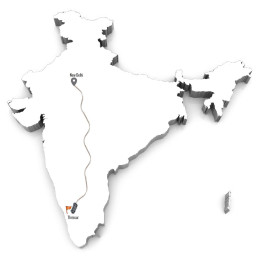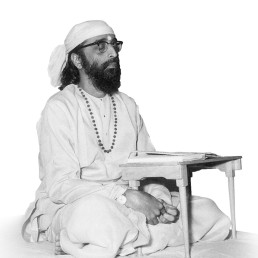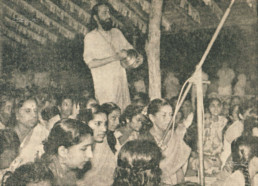
Jnana Yajna 68

Year & Dates:
March 26, 1960 to April 15, 1960

Yajna Topic:
Shrimad Bhagavad Gita- Chapter 3

Place:
Thrissur, India.
With the auspicious Grace of Bhagavan Shiva in the venerated Vadakkunnathan Temple, the 68th Jnana Yajna of Pujya Gurudev was inaugurated on March 26, 1960 by Dr. K. C. K. E. Raja, Vice-Chancellor of Kerala University. The yajnashala in front of the temple was predictably larger than the one constructed for the 1957 yajna. The reception of Pujya Gurudev with the energizing rhythm and resonance of the Panchavaadya and Naadasvara energized the atmosphere. After the Om Flag was hoisted by Sri K. Thangappa Menon, Secretary of the Yajna Committee, with the Raja and Rani of Kollengode attending, Sri Menon welcomed all. Stating how Vedanta was neither escapism nor pessimism, He reiterated the clarion call of Pujya Gurudev quoting Him: “Working in a spirit of dedication, chastened with right knowledge, is the culmination of devotion for the Lord.”
Mastering the Art of Action
The topic to be reflected on – Srimad Bhagavad Gita Chapter 3, Karma Yoga – holds Bhagavan Krishna’s principal guidelines for a meaningful life. Outlining how economic and scientific progress need cultural and religious reinforcement, Pujya Gurudev made the audience think about value-based actions that ultimately bring peace and prosperity to a country. He prefaced, “By developing Industry, and by constructing dams, by raising the Wealth of the nation, the History of that Nation cannot be built up; Science alone cannot inaugurate History. Similarly, religion alone cannot bring about History. But Science together with Religion alone can construct the History of a people. Rehabilitation of man nowadays is absolutely necessary. Even though we have got food, shelter, wealth and every comfort, yet we are miserable, unhappy. Still, we are in the quest of the unknown, the unrealised Peace.”
Pujya Gurudev devoted the morning sessions to a study of Kenopanishad. The deep study in that yajnashala had to be tested for its endurance. So, Nature unleashed a thunderous storm that struck down the pandal one evening at 3 pm. Again, there was no injury. Neither Pujya Gurudev nor the devotees were fazed. The pandal was re-erected within that night, a testimony to undaunted Karma Yoga. The forces of Nature withdrew to witness the 68th yajna march on with determination.
The Akhanda Kirtan on April 8th to 10th in the Krishna Temple at Kulacheri, the Vishnu Sahasranama Laksharchana on April 10th, and the Gangajal procession exemplified devoted actions. When Pujya Gurudev concluded His discourses on April 14, it was the New Year Day in Kerala – the Vishu. The Gurudakshina ceremony and Ganga jala prokshana marked a holy beginning with gratitude for the Guru’s blessings. A fitting conclusion was the yatra on April 15th to Kaladi, the birthplace of Jagad Guru Adi Shankara. In a memorable satsang there, Pujya Gurudev explained the difference between destiny and Purushartha: “What we meet in life is destiny, but how we meet them is our Purushartha. And what we meet in life is very insignificant, but how we meet them is very important, for the latter decides our future. Today we are no doubt the helpless product of our past (destiny), but surely we are the masters, the architects of tomorrow. For the past modified in the present is our future.”

“Think,” Says Pujya Gurudev
Through selfless work an individual gains an increasing amount of inner poise and when such a single-pointed mind is brought to function at the meditation seat, the mediator gains the experience of transcending his limited ego. To such a perfected one work is not a training to purify himself but it is a fulfillment of his own God-realization.
It is a fact that we are egged on to activity seeking and demanding a better satisfaction and a complete contentment. Satisfaction and contentment are two wheels of the life-chariot. In order to gain a better satisfaction and to reach nearer the point of contentment we are goaded to act in the outer world to earn and to save, to hoard and to spend. But the man of perfection, who, in the transcendence of his limited identification with his matter envelopments gets himself ushered into the All-perfect Realm of the Spirit feels so satisfied with the State of Self-hood which he attains, that he comes to experience a complete sense of contentment in that the very Divine experience is eternal satisfaction for him.
From Tyagi Magazine
Choose Freedom and Break Free!
The ego, driven by vasanas (impressions), mistakenly identifies itself as the doer, leading to suffering and confusion. The wise recognize the pure Consciousness behind all actions, understanding that the ego is merely a reflection, unaffected by the turmoil of the body and mind. By disengaging from egoic identification, one finds peace and clarity in the light of Consciousness.
